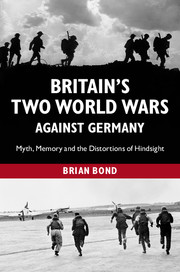Book contents
- Frontmatter
- Contents
- Acknowledgements
- Introduction
- 1 The creation of myths after 1945
- 2 British policy and strategy
- 3 British generalship in the two world wars
- 4 At the sharp end: combat experience in the two world wars
- 5 Attrition in the First World War: the naval blockade
- 6 Attrition in the Second World War: The strategic bombing of Germany
- 7 The transformation of war on the Western Front, 1914–1918
- 8 The British Army’s learning process in the Second World War
- 9 After the wars: Britain’s gains and losses
- Appendix
- Select bibliography
- Index
- References
4 - At the sharp end: combat experience in the two world wars
Published online by Cambridge University Press: 05 October 2014
- Frontmatter
- Contents
- Acknowledgements
- Introduction
- 1 The creation of myths after 1945
- 2 British policy and strategy
- 3 British generalship in the two world wars
- 4 At the sharp end: combat experience in the two world wars
- 5 Attrition in the First World War: the naval blockade
- 6 Attrition in the Second World War: The strategic bombing of Germany
- 7 The transformation of war on the Western Front, 1914–1918
- 8 The British Army’s learning process in the Second World War
- 9 After the wars: Britain’s gains and losses
- Appendix
- Select bibliography
- Index
- References
Summary
The unique awfulness and ‘horror’ of the First World War has become so deeply entrenched in British folk memory that it may seem almost blasphemous to suggest that combat conditions in other modern conflicts have been equally dreadful or, in some particular cases, even worse. Yet contemporary historians, including John Ellis, John Bourne and Gary Sheffield, have shown that modern industrialised war is always horrific for soldiers ‘at the sharp end’, that is in close proximity to the enemy. Why then has the First World War, and above all the Western Front, retained and even increased its reputation for unique dreadfulness and futility?
Here are some of the answers. Before 1914 the nature of modern war had not been properly understood by the British public. Romantic illusions flourished about a limited, chivalrous and exciting conflict that might well be ‘over by Christmas’. Rupert Brooke, in his poem ‘Peace’ (1914), touched on another appealing theme with his line about ‘swimmers into cleanness leaping’, while Philip Larkin would much later allude nostalgically to the spirit of innocence prevalent in 1914 but soon to disappear forever.
- Type
- Chapter
- Information
- Britain's Two World Wars against GermanyMyth, Memory and the Distortions of Hindsight, pp. 62 - 87Publisher: Cambridge University PressPrint publication year: 2014



